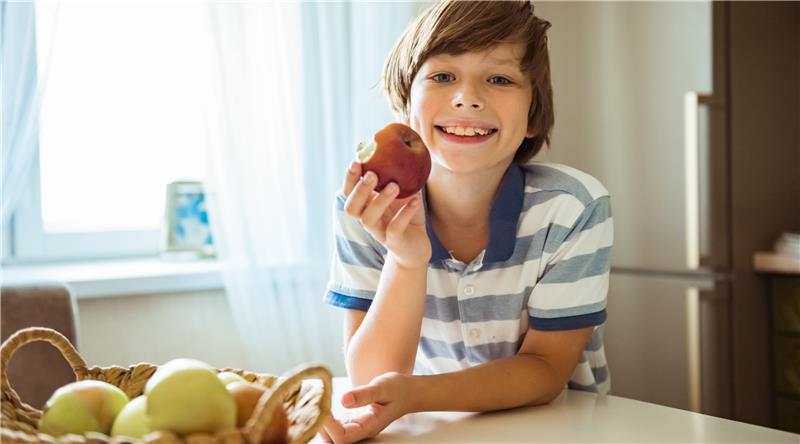
Como incentivar uma relação positiva com a comida desde a infância
Share
A nutrição na infância desempenha um papel crucial no desenvolvimento físico, emocional e social das crianças. Com a crescente exposição a opções alimentares menos saudáveis em contextos sociais e celebrações, torna-se essencial implementar estratégias compensatórias que promovam hábitos equilibrados sem comprometer o prazer e a socialização. Este artigo explora abordagens práticas para pais e educadores, com foco na criação de uma relação positiva com a comida.
Incentive uma relação positiva com a comida.
1. Envolvimento na preparação das refeições
Convidar as crianças a participar no planeamento e preparação das refeições é uma estratégia eficaz para despertar o interesse por alimentos saudáveis. Este envolvimento pode ser incentivado em casa e também no contexto escolar, por exemplo, com atividades comemorativas como o Dia Mundial da Alimentação ou o Dia Mundial da Saúde. Estas ocasiões permitem que as crianças explorem texturas, aromas e sabores de uma forma prática e divertida.
2.º Respeite os sinais de fome e saciedade deles.
É fundamental permitir que a criança coma de acordo com o seu apetite, sem a pressionar para "esvaziar o prato". Esta abordagem reduz o risco de desregulação do apetite e promove uma relação saudável com a comida.
Pode sempre incentivar o seu filho a experimentar um novo alimento e promover a exposição repetida ao mesmo alimento de diferentes formas, mas sempre sem o pressionar. A rejeição de alguns alimentos não significa que a criança não goste deles, apenas que precisa de se familiarizar com eles.
3.º Evite usar a comida como recompensa ou castigo.
Frases como "se comeres tudo, podes comer sobremesa", "se não comeres sopa, não comes sobremesa" ou "se te portares bem, compro-te um gelado" condicionam a relação da criança com a comida, criando associações emocionais negativas ou dependência de determinados alimentos. O foco deve estar na escolha de alimentos nutritivos e saborosos, sem imposições excessivas.
4.º Evite demonizar os alimentos
É muito importante não diabolizar em excesso os alimentos não saudáveis e mostrar que também podem ser incluídos espontaneamente numa dieta saudável. Esta restrição extrema pode até gerar maior interesse pelos mesmos. O ideal é integrar estes alimentos em contextos equilibrados, ensinando desde cedo o conceito de moderação .
5.º Não faça comentários sobre o peso ou a aparência física da criança ou de outras pessoas.
O peso é um tema sensível, mesmo na infância. Comentários negativos sobre o apetite ou o peso da criança, seja em casos de excesso ou insuficiência, devem ser evitados, pois podem agravar o problema. É importante ouvir os sentimentos da criança em relação à sua imagem corporal e à alimentação, oferecendo compreensão e apoio. Esta atenção é crucial para preservar a autoestima e prevenir futuros distúrbios alimentares.
Vida social e gastronomia: festas e celebrações
Os eventos sociais, como as festas de aniversário, costumam oferecer uma abundância de opções ultraprocessadas, como refrigerantes, bolos açucarados e snacks industrializados. Embora estas ocasiões sejam esporádicas, é importante que os pais e os organizadores considerem alternativas mais equilibradas.
Sugestões como incluir fruta em formatos apelativos, mini sanduíches saudáveis ou sumos naturais são formas criativas de unir celebração e saúde. Este equilíbrio permite que as crianças aprendam a fazer escolhas sem perder o prazer do momento.
Na Oh! MySnacks, temos opções que se enquadram tanto em refeições em eventos sociais (como festas de aniversário) como em presentes.
- Tarte de alperce sem açúcar
- Biscoitos Bio de Cacau e Avelã
- Bolachas de morango
- Bolo com cacau e baunilha
- Bolinhas de proteína com creme de chocolate e amendoins salgados
- Pizza Salty Fusion Viciada
A importância dos seguintes modelos
As crianças aprendem observando os outros. 2,3 Os pais e os cuidadores desempenham um papel fundamental na demonstração de hábitos alimentares saudáveis, como o consumo regular de frutas e legumes e a prevenção de comportamentos alimentares inadequados. Um ambiente estruturado, com rotinas claras para as refeições, incentiva escolhas saudáveis de forma natural. 1.4
Conclusão
Criar uma relação saudável com a alimentação na infância é um investimento no bem-estar futuro. Respeitar os sinais de fome, promover a participação nas decisões alimentares e equilibrar as celebrações com alternativas saudáveis são estratégias eficazes.
A abordagem deve ser acolhedora e sem julgamentos, reforçando a ideia de que a comida é tanto uma necessidade como uma fonte de prazer. Ao promover uma visão positiva da alimentação, estamos a construir as bases para que as crianças cresçam com hábitos saudáveis e uma relação equilibrada com a comida.
Referências
- Portugal. Ministério da Saúde. Direção-Geral da Saúde. PNPAS. 10 (+1) Recomendações para uma alimentação saudável no regresso às aulas. Setembro de 2024.
- Ambrosini G, Emmett P, Northstone K, Jebb S. Rastreio de um padrão alimentar associado ao aumento da adiposidade na infância e adolescência. Obesity (Silver Spring). 2014;22(2): 458-65.
- Vilela S, Oliveira A, Ramos E, Moreira P, Barros H, Lopes C. Associação entre o consumo de alimentos com elevada densidade energética aos 2 anos de idade e a qualidade da dieta aos 4 anos de idade. Br J Nutr. 2014;111 (7):1275-82.
- Portugal. Ministério da Saúde. Direção-Geral da Saúde. Alimentação Saudável dos 0 aos 6 anos – Linhas De Orientação Para Profissionais E Educadores Lisboa: Direção-Geral da Saúde, 2019. ISBN: 978-972-675-292-9 1ª Edição - Outubro de 2019
Autor:
Matilde De Carvalho (NI.5756N)
